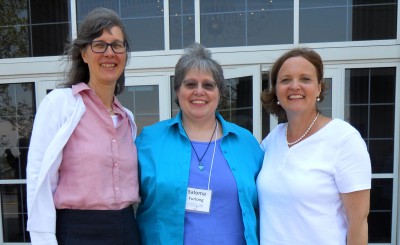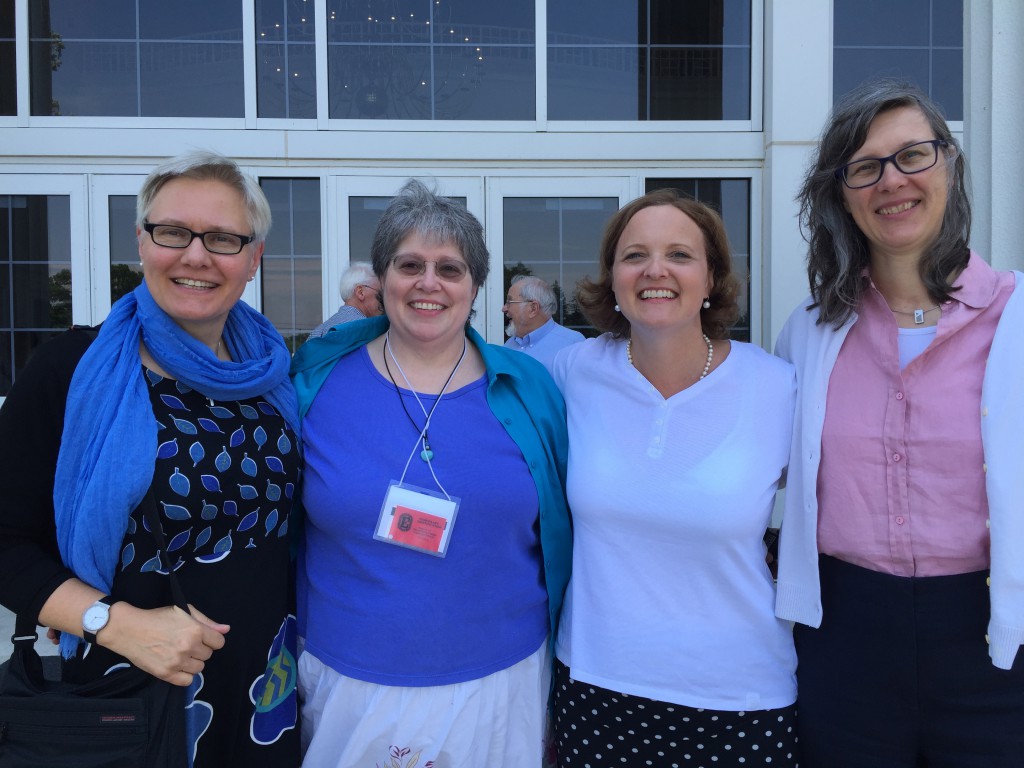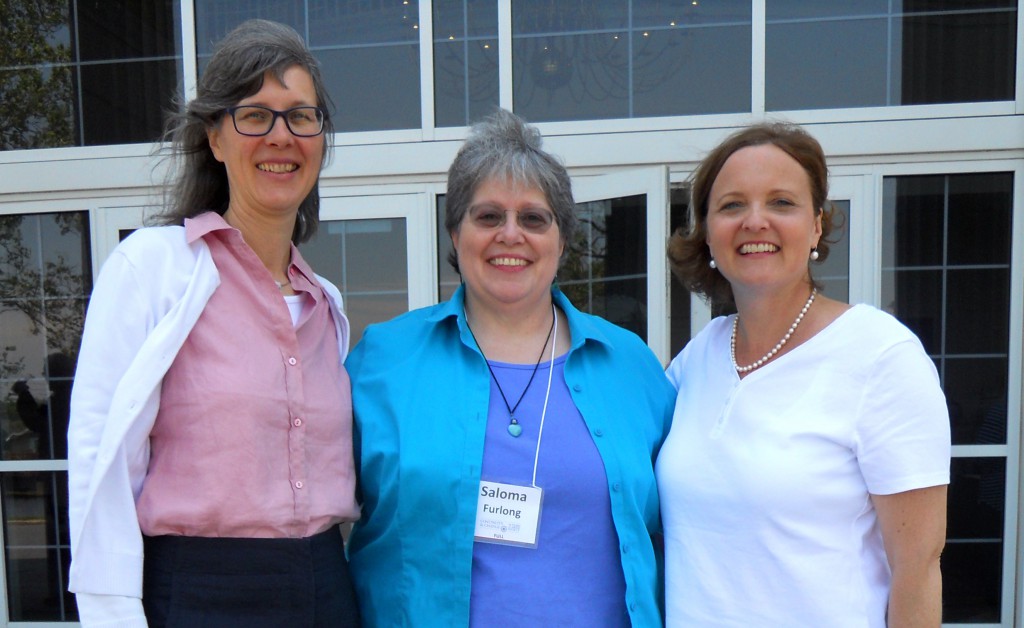
Claudia Lillinger, myself, Sabrina Völz
First I want to announce that Sabrina Völz has posted the second half of the interview with me on the American Studies Blog. Her introduction to the interview and the questions are quite evocative. I hope you’ll enjoy the interview.
Now I want to return to the conference this past weekend. One of the wonderful aspects of attending a conference is meeting new people. I knew that Sabrina Völz was going to be there and I looked forward to meeting her. She and two friends and colleagues, Inga Dwenger and Claudia Lillinger, presented papers in a session called The Amish as Seen through Other Eyes. Inga lectures in English pedagogy at Leuphana University, and Claudia teaches English and religious education in a high school in Lüneberg. They presented a paper called “The Individual is Not the Primary Reality: Amish Identity.” Their presentation was based on a teaching sequence they created that use interactive approaches to promote understanding of Amish identity and culture. One example: they asked volunteers to come forward and to place themselves by the sign “individual” or “community” according to which they found more important. One of the volunteers was former Amish, and he did exactly what I would have done — he placed himself right in the middle between the two. Then Claudia asked each person why they chose the position they did. They also asked each person to think of a childhood memory and then they passed out vignettes written by Amish people and asked people to compare their memories with the Amish written memory. I ended up with one of my own vignettes. It was really strange to read my own writing in that context.
One of the tools Claudia and Inga presented was the Weird Al Yankovic skit called Amish Paradise. They asked people how they felt about using that as a learning tool. They emphasized that they present this as a parody. The room became really quiet. In matters like this, I usually find myself with an Amish reaction rather than the one I would have thought I would have acquired by now, given I’ve lived in the mainstream culture for the last 36 years. The one Amish woman in the room just gave a quiet thumbs down. I was right there with her. I later told Claudia and Inga that even though they present this as a parody, I thought that it would stick in students’ minds more than anything they read about the Amish, and that it leaves them with faulty impressions of Amish life and culture.
Though I don’t agree with using parodies of the Amish as a learning tool, Claudia and Inga are doing important work in Germany. Claudia mentioned that when she was going to high school, she did not know anything about the Amish because nothing was being taught about them in school. I found it surprising that this is not taught as part of German history, given that Amish and Mennonites lived in Germany for more than a century before they emigrated to the United States. I hope that more German teachers and professors will integrate Amish studies into their curricula.
Sabrina Völz, whom you’ve already met, teaches English and American Studies (hence the American Studies Blog) at Leuphana University. Her presentation was called, “Balancing Art with Factuality: Saloma Miller Furlong’s Memoirs.” As you can imagine, it was intriguing to sit in on a presentation about my work, rather than presenting my own work. I’ve been at book discussion groups in which they were discussing my books, but I always felt like I was changing the dynamics, just by virtue of me being there because people would be less honest or critical. Sabrina had already told me that she would be critical of some aspects of my first book in particular. So I felt like I was a fly on the wall. Most of the audience did not know I was sitting among them until I spoke at the end.
There has been something sitting in my unconscious for a long time that Sabrina articulated. She said that once someone Amish leaves the community, it’s almost as if scholars are no longer interested in them as subjects. I could not have said it better myself. I’ve been trying to convey in my writing something that an Amish person once said to me, “One thing the scholars will never get right is the Amish mindset.” This person is absolutely right — unless you have lived an Amish life, there is no way to understand that. My hope is that eventually people will seek the true Amish narrative, as presented by Amish and former Amish memoir writers and that it will replace the stereotypes and misinformation as conveyed in Amish romance novels and Amish reality television shows.
Sabrina’s approach to Amish memoirs is a literary one. First she gave us an overview of literary theory, and then she talked about my books in general, focusing mostly on Why I Left the Amish. She gave her analysis of what she thought worked and what didn’t. She thought the dialog should have been broken up more because it was hard for the reader to believe that I would remember such long stints of dialog well enough to quote it verbatim. She liked the use of metaphor, especially the one of a butterfly, both from the point of view of transforming from a chrysalis to a butterfly, and the idea of freedom.
The criticism I’ve heard many times before, is the one concerning that of “outing” my family members. If you read the Amazon or Goodreads reviews of my first book, there are people who have very strong feelings about that. I address this in the interview on the American Studies Blog, so I will not go into detail here.
At the end of her presentation, Sabrina took questions from the audience. One gentleman had very strong feelings about the title Why I Left the Amish. He was echoing reviews I’d read when the book first came out. He thought “Why I Left My Family” was far more appropriate. Sabrina defended the title, pointing out that I did leave the Amish, but only after seeking help and receiving none, so I was justified to use that title. This answer did not satisfy him. He wanted to argue his point. Then the other former Amish person in the room made the point that it would not have taken much for me to have stayed in the community when I went back, but that I was not getting anything from the community that I needed. He said that he thinks I would have stayed, had I received understanding from even a few people. He motioned to me and said that perhaps I would comment on that.
The most awkward moment came when I started talking. I was sitting in the far corner of the room, and all heads turned towards me and many people looked very surprised. Since this was already a brand-new experience to have my book discussed, I didn’t shy away. I said that at book talks I am often asked if had been born into a well-adjusted and happy Amish family, would I have stayed. I always respond with saying, “It depends on the nature I was born with. If I had been born with a restless nature, I would still not have fit into that community. And my desire for education might have been enough to propel me out of the culture all by itself. So the answer to that question is, I simply don’t know.”
The convenor announced that we were out of time at that point.
People have asked me if that was weird to have my work discussed in front of me. Perhaps it is very un-Amish of me to say this, but it was flattering to have my work discussed, and I wouldn’t have wanted it to be all glowing because that would not have been seen as valid scholarship. One of the attendees at the conference said that he thought one has entered into a new realm when one’s work is the topic of discussion. This experience was different but I’m glad I was there. I think it was probably weird for Sabrina to be so honest about my work with me sitting there. I think it took more courage for her than it did for me.
I will write part 3 to the Amish conference in a few days. In the meantime, I hope you will head on over to the Amish Studies Blog to read the interview with Sabrina, if you haven’t already.
Below is a photo of me with my three new German friends. I post this with a little trepidation, given I look so disheveled. However, this is the only photo I have of the four of us.

Inga, myself, Sabrina, Claudia



A Fly on the Wall! I think the only way to sit quietly through a discussion like you did without defending yourself is if you are beyond caring what people think of you.
Hello Katie. There is a certain amount of detachment or growing a thick skin, however you want to define it, that comes from having your writing critiqued over a matter of 5 1/2 years.
Of course we all care what people think of us to some degree. But it is not what it used to be in my Amish world — there it cut to the core whenever someone criticized me for any reason. At this point in my life, being happy with myself is more important than pleasing others. Perhaps I have gotten to that age :-)
I hope you are doing well, Katie.
I think I am where you are, being happy with myself.
It’s a good place to be, isn’t it? It’s why people love you as they do… you exude self-contentment and a radiance that people are drawn to.
Blessings to you, Katie.
Saloma, Thanks so much for your comments about your attending the Amish Conference. I would have truly enjoyed the conference I am sure. I would have wanted to be in several places at one time I am sure.
I have been asked lately to come to different libraries to give more info about the different amish novels that have been translated into the Dutch language. The lady that translates Wanda Brunstetter’s books was also there. (She does a good job of translating by the way). Most of the novels do have an element of truth in them to make them sound authentic. I call them feel good books and explained why. I gave more info on the Amish lifestyle that they wanted to know by the kind of questions they asked. There was one lady in the audience who was not very pleasant and in the break she tried to pin me down with all kinds of questions that no matter how I would answer she would show her disapproval of the Amish. She dominated the time so much, I finally told her to try out the snacks that had been provided. At the very end of the session, she headed up to me with one last piece of wisdom. I had been asked why the Amish don’t really approve of higher education. I explained as well as I could and I felt like it was understood. Sure enough this was what upset the lady for sure. She said_ You mean to tell us that none of the Amish have anymore schooling that the lower grades. Don’t they even care that this just isn’t decent”. I said this is how they do it. Oh, she said, what do you think. I said I was fine with it. She was so upset and I was very uncomfortable with her by this time. I finally resorted to my standard answer when this kind of thing comes up and I said _We aren’t members of the Amish and therefore our ideas of what they do or don’t do won’t change things. I have given information about a group of people and if you don’t agree with it, I can’t help you any further. I don’t usually have too much trouble with people here who invite me to talke about the Amish if they are members of the Dutch Reform Church. I do get completely different questions if the audience doesn’t have any kind of church affiliation. Greetings to you. Mary
Mary, welcome to the world of speaking to the public. There always seem to be one or two people in a given audience who tend to dominate the discussion. I will sometimes not recognize them after the first question, saying that I want to give others a chance first.
I have developed a fairly standard answer for those who want to demonize the Amish. It is close to what you said — I usually say that we cannot judge the Amish by our standards (except in the case of overt abuses).
In terms of the Amish not educating their children beyond the eighth grade, I always tell people that if there is one thing I could change about the Amish culture, it’s that they educate their children beyond the eighth grade, even if it’s just for two more years in their own schools, because of all the things that would come of that. I follow up by saying that it’s not up to me.
In terms of religious versus secular beliefs — I sometimes have more opposition from people who judge the Amish people as needing to be “saved.” They will try to trap me by asking if the Amish are rules-based or faith-based. I will say they are both. Often I’ve had people ask me a follow-up question, as if I didn’t understand what they were getting at. So then I tell them what I heard from an Amish bishop once. He said he liked the metaphor that C. S. Lewis used. He said that faith and works are like two parts of a pair of scissors… you need both for the scissors to work.
I wish you all the best with the talks. I am going to be doing one next weekend for the first time in more than a year. Wish me luck!
Have a happy summer, Mary.
Thanks so much for your helpful reply. I felt so bad after that encounter with the lady even tho I have had hard questions more times. My daughter lived 1/2 yr with an Amish family in Mt Eaton, Ohio. The father of the family was always concerned about giving the Amish children more than the lower grades so he went and joined the public school board, got acquainted with those people and they with him. When he got reprimanded for doing this he simply withdrew but he had set up his network. Now the Amish children have the option of going 2 more yrs after the grade school A special facility is set up as a trade school. I met the same kind of Amish father one time in Yoder, Ks and he did the same thing. I thot it was very interesting. I hope you to have a pleasant summer.
Thanks so much for sharing about the conference. I admire that you could sit through a critique of your writing, and could respond with dignity. It sounds like this would have been a very interesting conference to attend.
How often are these held and how does one get information about them?
Hello Sadie! It’s so great to hear from you.
Normally these Amish conferences happen at E-Town about every three or four years. I will put you in touch with someone at the Young Center so you can be notified when the next one comes up.
Do you know about the one happening at EMU next spring? It’s called
“Crossing the Line: Women of Anabaptist Traditions Encounter Borders and Boundaries.” Here is a link to the website: http://www.emu.edu/academic-conferences/women-of-anabaptist-traditions/
I hope to see you at one of these conferences!
Have a happy summer!